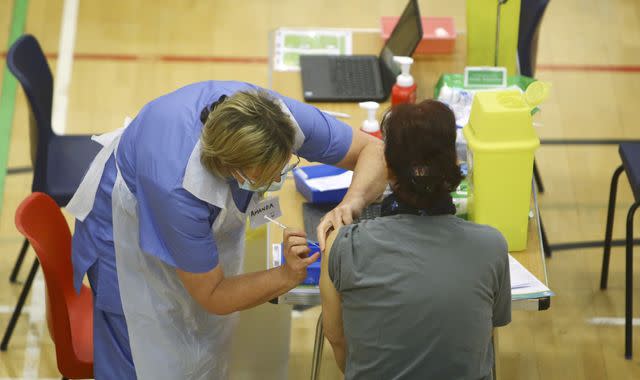COVID-19: Vaccines tweaked to deal with coronavirus variants to be fast-tracked by regulator

Coronavirus vaccines that have been tweaked to deal with new variants of the disease will be fast-tracked for authorisation, the UK regulator has said.
According to new guidance, manufacturers must provide robust evidence that the modified jab triggers an immune response, but lengthier clinical studies that don't offer data on safety or effectiveness won't be required.
Live COVID updates from the UK and around the world
The Medicines and Healthcare products Regulatory Agency (MHRA) says researchers are now in a better position to measure immunity against COVID-19 by monitoring antibodies after vaccination.
It claims this will "significantly reduce" the amount of time it takes to get a tweaked jab approved and ready for use.
And it also means the three-phase safety trials required for the original coronavirus vaccines won't be needed.
So far, both the Oxford-AstraZeneca and Pfizer-BioNTech jabs have shown to be effective against the so-called UK or Kent variant that emerged in the South East late last year.
But there are still question marks over the South Africa and Brazil variants, which have both been detected in the UK and have resulted in emergency surge testing in certain areas.
One first identified in the Brazilian city of Manaus is proving especially concerning - a study this week suggested that between 25% and 61% of people there who had previously had COVID-19 were susceptible to reinfection with the worrying P1 variant.
Six cases of P1 have been found in the UK to date - three in England and three in Scotland.
Subscribe to the Daily podcast on Apple Podcasts, Google Podcasts, Spotify, Spreaker
The new guidance has come from Access Consortium - a group made up of regulatory bodies from the UK, Australia, Canada, Singapore and Switzerland.
It will create a similar system to that used to fast-track tweaked flu vaccines that are updated every year to cater to how the virus is mutating.
Dr June Raine, chief executive of the MHRA, said: "We have a clear goal that future vaccine modifications that respond to new variants of coronavirus can be made in the shortest possible time without compromising safety, quality or effectiveness."
Dr Christian Schneider, chief scientific officer at the MHRA, added: "The announcement today also demonstrates the strength of our international partnerships with other regulators and how our global work can help ensure faster access to life-saving vaccines in the UK and around the world.
"The public should be confident that no vaccine would be approved unless the expected high standards of safety, quality and effectiveness are met."
Analysis: Five-month vaccine tweaks could still be a potentially perilous delay for the NHS
By Thomas Moore, science correspondent
The process for developing a new generation of tweaked vaccines is fast, but not fast enough.
It would take around five months from start to finish. That's less than half the time that it took to develop the COVID jabs we have today - and that was a record.
But it took just six weeks for the Kent variant to spread across the country and cause a surge of infections that threatened to overwhelm hospitals.
The medical regulator has said it will only require small, relatively quick studies to confirm modified vaccines are safe and effective.
But manufacturers can't shorten the three to four week gap between doses in the clinical trial. Nor can they do anything to speed up the biological process that makes the vaccines - that adds another two months.
Add on some time for lab work and safety checks and you get to five months - a potentially perilous delay for the NHS.
If a dangerous new variant evolves abroad, the government could attempt to stop it being imported with flight bans and hotel quarantines.
But that comes with a high economic cost, it limits people's freedom to travel and there are no guarantees that it works.
Some vaccine developers are now trying to build in some insurance against mutations. Rather than relying on the shape-shifting spike protein they add other targets from the virus.
That should mean the vaccines remain effective, even if the virus evolves.
Rather than chasing the virus, they are trying to get ahead. It's a strategy that stands a much better chance of ending the pandemic once and for all.

 Yahoo News
Yahoo News 